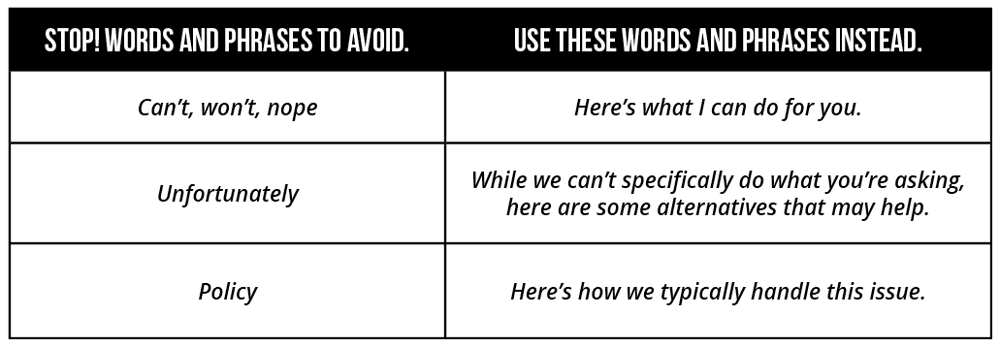Customer Service Stop Words
 This article was originally published on the FCR blog on October 28, 2016. Click here to read the original post.
This article was originally published on the FCR blog on October 28, 2016. Click here to read the original post.
I’ve written extensively in the past about my dislike for the word “Unfortunately” and the importance of removing it from our customer service vocabulary. I had a boss once that disliked the word so much so that he hacked our ticket system so we couldn’t send an email to a customer with that word in it.
More than one person in the last few years has challenged me by saying that there are always going to be situations where there’s nothing we can do for the customer and unfortunately is the best word. I’ve challenged my colleagues to show me an email where they were inclined to use the word, or its many synonyms, and we would work together to instead spin it toward what we CAN do for the customer.
Fast forward a bit and I’ve been working lately with some of our clients on defining what a great customer interaction looks and sounds like for their brand. I talked about words like unfortunately, can’t, won’t, and policy. One client looked at me and said, “Oh, we call those Stop Words.” Get it? As in stop using those words! Brilliant, right?
This really got me thinking. What are the words and phrases I don’t want my colleagues to say to customers and what do I propose they use instead?

Using these stop words not only puts up a wall between you and your customer on that particular interaction, but it can also seriously impair your ability to do business with them in the future. As you are thinking through this list, I also recommend defining how you want your agents to speak in scenarios like the following:
- How to tell customers when your service is having an issue without damaging customer confidence. For example, outage and server down should be used very sparingly.
- How to speak of your competition without bad mouthing them.
- How to voice frustration over a situation without throwing the company under the bus.
By defining this up front with your team, you take great strides to present a positive message to your customers that says you truly want to do business with them. Even if you occasionally have to direct them to another company for a solution, they will often grow to trust you as an advisor and will still feel comfortable referring business to you.
Also, for extra credit, don’t forget to ask your agents how often they feel inclined to use these stop words. This will be a great source of learning that can help you identify and alleviate customer and agent pain points. Simply getting rid of the stop words won’t necessarily improve the customer experience.
Unfortunately, my list of stop words is still fairly limited. Leave me a note and let me know what some of your customer service stop words and phrases are. I have a feeling there are some good ones out there.
I’m a call coach/quality assurance specialist for a company that prints wedding and social invitations. One of my biggest pet peeves is the use of weak phrasing.
Weak phrases come across to the caller as though we’re not 100% sure of the answer we’re giving. Avoid using weak phrases. Instead, use confident phrasing.
Examples of weak phrases include: “looks like”, “probably”, “maybe”, “might be”, “should be”, “I’m pretty sure”, “I would guess”, “I think”, and “I believe”.
Weak phrasing example:
“Looks like she just placed this order today so I think your proofs could be sent to you, umm, about Monday or so.”
–Looks can be deceiving, and the caller doesn’t care what we think is the answer. They called because they want to know what the answer is. We’re the knowledge experts representing our company; stay confident. We may not have a concrete answer at this moment because there could be variables at play. But, that’s not an excuse to use weak phrasing. Whatever information we do have, state it clearly and confidently. We don’t want the caller walking away questioning the accuracy of our statements.
Confident phrasing example:
“The order was entered today, and I estimate the proof will be sent to your email address on Monday.”
Both the weak phrasing example and the confident phrasing example statement are time-based estimates and both advise that Monday is when she should get the proofs. The difference is this: The confident statement holds more weight because it’s clear, concise, and convincing; the caller won’t question the example statement.
Jim, Thank you so much for your thoughtful comment. I hadn’t given this a whole lot of thought but you’ve definitely piqued my interest in the importance of confident phrasing.
Pingback: Learning to Consider Others - Customer Service Life